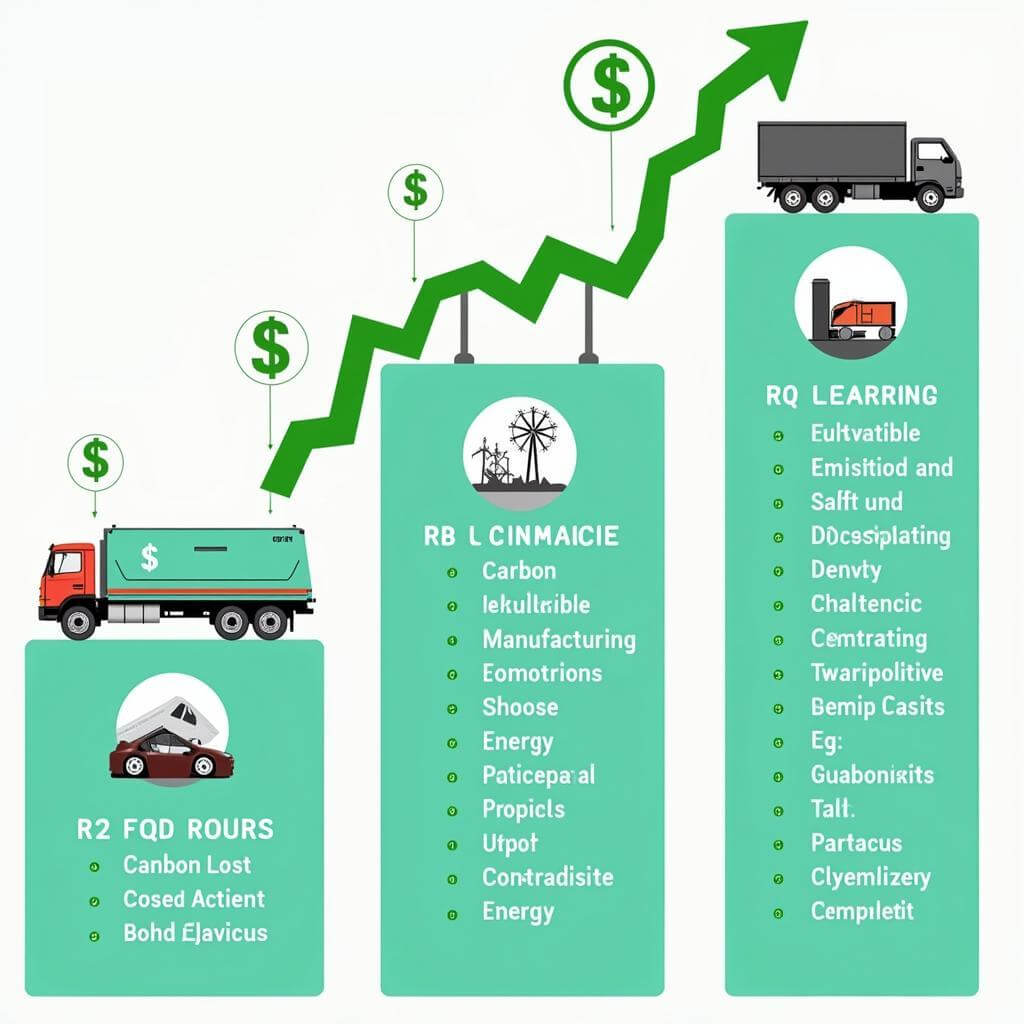Carbon emissions and their impact on climate change have become a pressing global concern. This topic has gained significant traction in recent years, appearing frequently in IELTS Writing Task 2 questions. Based on trends observed in past exams and the growing importance of environmental issues, it’s highly likely that questions related to carbon emissions and corporate responsibility will continue to feature prominently in future IELTS tests.
One of the most relevant and recurring question types on this subject is whether companies should be required to pay more for their carbon emissions. Let’s examine a specific example of such a question and explore how to approach it effectively.
Analyzing the Question
Some people believe that companies should pay more for the carbon emissions they produce. To what extent do you agree or disagree?
This question is asking for your opinion on whether companies should be financially responsible for their carbon emissions. It’s important to note that this is an agree/disagree question, which means you need to clearly state your position and support it with relevant arguments and examples.
Key points to consider:
- The concept of corporate responsibility for environmental impact
- The potential effects of increased costs on businesses and the economy
- The environmental benefits of such a policy
- Alternative approaches to reducing carbon emissions
Sample Essay 1 (Band 8-9)
In recent years, the debate over corporate responsibility for environmental protection has intensified, with many arguing that companies should bear a greater financial burden for their carbon emissions. I strongly agree with this viewpoint, as it not only addresses the pressing issue of climate change but also encourages businesses to adopt more sustainable practices.
Firstly, requiring companies to pay more for their carbon emissions creates a direct financial incentive for them to reduce their environmental impact. When faced with higher costs associated with pollution, businesses are more likely to invest in cleaner technologies and more efficient processes. This shift not only benefits the environment but can also lead to long-term cost savings and increased competitiveness for companies that adapt quickly. For instance, many automotive companies have accelerated their transition to electric vehicle production in response to stricter emissions regulations and associated costs.
Moreover, the “polluter pays” principle ensures that the true cost of environmental damage is reflected in the price of goods and services. Currently, the environmental costs of production are often externalized, meaning they are borne by society as a whole rather than by the companies responsible. By internalizing these costs, we create a more accurate pricing system that encourages both businesses and consumers to make more environmentally conscious choices. This approach has been successfully implemented in countries like Sweden, where a carbon tax has led to significant reductions in emissions without negatively impacting economic growth.
However, it is crucial to implement such policies carefully to avoid unintended consequences. A gradual increase in carbon pricing, coupled with support for affected industries to transition to cleaner practices, can help mitigate potential job losses or economic disruptions. Additionally, governments should consider reinvesting the revenue generated from increased carbon payments into research and development of green technologies, further accelerating the transition to a low-carbon economy.
In conclusion, I firmly believe that requiring companies to pay more for their carbon emissions is a necessary step towards combating climate change and promoting sustainable business practices. While careful implementation is essential, the long-term benefits to the environment and the economy far outweigh the short-term challenges. By holding corporations financially accountable for their environmental impact, we can drive innovation, encourage responsible consumption, and work towards a more sustainable future for all.
 Companies paying more for carbon emissions
Companies paying more for carbon emissions
Sample Essay 2 (Band 6-7)
The idea of making companies pay more for their carbon emissions is becoming more popular these days. In my opinion, I agree that this is a good idea, but I also think there are some problems that need to be considered.
On the one hand, making companies pay more for pollution can help reduce carbon emissions. When businesses have to spend more money because of their emissions, they will try to find ways to pollute less. This could mean using cleaner energy sources or improving their manufacturing processes. For example, some car companies are now making more electric cars because of stricter rules about emissions. This shows that when there is a financial reason, companies can change their behavior.
Another reason why I agree with this idea is that it’s fair. Companies that pollute more should pay more because they are causing more damage to the environment. This is like the idea of “the polluter pays” which is used in many countries. It means that the ones who create the problem should be responsible for fixing it. If companies have to pay for their emissions, they might think twice before making decisions that harm the environment.
However, there are also some potential downsides to this approach. If companies have to pay a lot more for their emissions, they might raise the prices of their products. This could make things more expensive for consumers, which could be a problem, especially for people who don’t have much money. Also, some companies might decide to move their factories to countries with less strict rules about emissions, which could lead to job losses.
In conclusion, while I believe that making companies pay more for their carbon emissions is generally a good idea, it’s important to implement this policy carefully. Governments should find a balance between encouraging companies to reduce their emissions and not causing too much economic hardship. Maybe they could introduce these changes slowly and offer help to companies that are trying to become more environmentally friendly.
Sample Essay 3 (Band 5-6)
Nowadays, many people think companies should pay more money for the carbon emissions they make. I agree with this idea because it can help protect the environment.
First, if companies have to pay more for pollution, they will try to pollute less. This is good for the environment because it means less carbon in the air. For example, if a factory has to pay a lot of money for its emissions, it might buy new machines that don’t pollute as much. This can help reduce global warming.
Also, it’s fair for companies to pay for their pollution. They make money from their products, so they should also pay for the problems they cause. If they don’t pay, then everyone else has to deal with the pollution and its effects. This is not fair to people who don’t benefit from the company’s business.
But there are some problems with this idea too. If companies have to pay more, they might make their products more expensive. This means people have to pay more for things they need. Also, some companies might move to other countries where they don’t have to pay for pollution. This could mean people lose their jobs.
In conclusion, I think it’s a good idea for companies to pay more for their carbon emissions, but we need to be careful about how we do it. We should find a way to protect the environment without making life too difficult for people.
 Balancing environmental protection and economic growth
Balancing environmental protection and economic growth
Scoring Explanation
Band 8-9 Essay:
This essay demonstrates excellent writing skills and a sophisticated approach to the topic.
- Task Response: The essay fully addresses all parts of the task, presenting a clear position and developing it thoroughly. It offers a well-balanced argument, considering multiple perspectives.
- Coherence and Cohesion: Ideas are logically organized with clear progression throughout. Paragraphs are well-linked, and cohesive devices are used effectively.
- Lexical Resource: A wide range of vocabulary is used accurately and appropriately. The essay includes less common lexical items and shows awareness of style and collocation.
- Grammatical Range and Accuracy: A wide range of grammatical structures is used accurately. Complex sentences are handled with confidence, and errors are rare.
Band 6-7 Essay:
This essay shows a good understanding of the task and presents relevant ideas.
- Task Response: The essay addresses the task, presenting a clear position. However, some ideas could be more fully developed.
- Coherence and Cohesion: There is a clear overall progression, but some paragraphs could be better linked.
- Lexical Resource: A sufficient range of vocabulary is used, with some attempts at less common words. There are occasional errors in word choice or spelling.
- Grammatical Range and Accuracy: A mix of simple and complex sentence forms is used. There are some errors, but they do not impede communication.
Band 5-6 Essay:
This essay demonstrates a basic understanding of the task and presents some relevant ideas.
- Task Response: The essay addresses the task in a general way, but some points lack detail or clarity.
- Coherence and Cohesion: There is a basic structure, but ideas are not always well-connected.
- Lexical Resource: A limited range of vocabulary is used, with some repetition. There are noticeable errors in word choice and spelling.
- Grammatical Range and Accuracy: Sentence structures are often simple or repetitive. Errors are frequent but do not greatly impede communication.
Key Vocabulary
-
Carbon emissions (noun) – /ˈkɑːrbən ɪˈmɪʃənz/ – The release of carbon dioxide into the atmosphere, typically as a result of burning fossil fuels.
-
Corporate responsibility (noun phrase) – /ˈkɔːrpərət rɪˌspɒnsəˈbɪləti/ – The idea that businesses should act in ways that benefit society and the environment.
-
Sustainable (adjective) – /səˈsteɪnəbəl/ – Able to be maintained at a certain rate or level without depleting natural resources or causing ecological damage.
-
Incentive (noun) – /ɪnˈsentɪv/ – Something that motivates or encourages someone to do something.
-
Externalize (verb) – /ɪkˈstɜːrnəlaɪz/ – To place the cost or responsibility for something outside of a system, typically onto society or the environment.
-
Polluter pays principle (noun phrase) – /pəˈluːtər peɪz ˈprɪnsəpəl/ – The practice of making the party responsible for producing pollution responsible for paying for the damage done to the environment.
-
Mitigate (verb) – /ˈmɪtɪɡeɪt/ – To make less severe, serious, or painful.
-
Innovation (noun) – /ˌɪnəˈveɪʃən/ – The action or process of introducing new ideas, devices, or methods.
 Innovative sustainable technologies reducing emissions
Innovative sustainable technologies reducing emissions
Conclusion
Understanding how to effectively approach IELTS Writing Task 2 questions about corporate responsibility for carbon emissions is crucial for success in the exam. The sample essays provided demonstrate different levels of writing proficiency and offer insights into how to structure arguments, use appropriate vocabulary, and address the task requirements.
As environmental concerns continue to grow, it’s likely that similar topics will appear in future IELTS exams. Some potential questions you might encounter could include:
- Should governments enforce a carbon tax to reduce emissions?
- Do the benefits of making companies pay for carbon emissions outweigh the drawbacks?
- Should companies be taxed based on their carbon emissions?
To improve your writing skills, try practicing with these topics and compare your essays to the samples provided. Remember to focus on clear organization, use a range of vocabulary and grammatical structures, and fully address all parts of the question. You can also share your practice essays in the comments section below for feedback and discussion with other learners. This active approach to learning can significantly enhance your IELTS Writing Task 2 performance.


